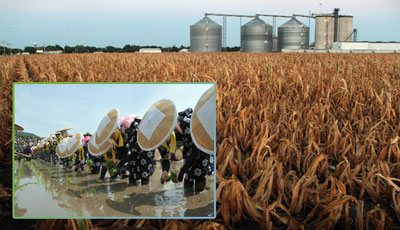
The key turned in the door and Kevin entered. At six-foot three, he loped rather than walked to the table where the women sat, folded himself in half and gave his wife a full kiss. Amaya involuntarily stiffened, and her cheeks reddened. She never could get used to the way Americans engaged in public acts of affection; necking ardently on park benches, groping each other on the dance floor, running their hands over their partner’s bodies while waiting for a bus. That wasn’t the way most Japanese people behaved.
“How’s my favorite girl? I missed you.”
“Fine. I missed you, too.” Amaya paused. “We have company.”
Kevin didn’t seem to get the hint and kissed her again “Yeah, I noticed. How’s it going, Marlene?”
Marlene put down her napkin and got up. “Just great. But I think I better leave you two lovebirds alone.”
She hugged Amaya. “Don’t worry so much. Things have a way of working out.” She pointed to the bag. “You two keep the bagels in case you need a late night snack.”
After she left, Kevin poured himself a Coke and sat down across from his wife. He was more angular than thin, with reddish-brown, unruly hair that defied the decrees of a comb, and freckled arms from years growing up on an Indiana farm. The only thing that hinted at his academic nature was the wire-rimmed oval glasses. His eyes were the first thing that Amaya had noticed about him. It was the feature that had caused her instantly to fall in love with him.
“What was all that about? Sounds like you and Marlene were having a pretty intense conversation? Any problems?”
Amaya wondered what she should say. She didn’t want to put any more pressure on him. “No, just the usual,” she said. “Expectant mother stuff. Everything’s fine.”
Kevin put down his glass and studied his hands. She knew it was what he did when he was worried. “What is wrong?” she asked.
“I don’t want to worry you.”
“It’s okay. Just tell me. Maybe I can help.”
“I spoke to my parents today,” he said.
“Oh? How are they?”
“So, so.” He paused. “Actually, not so good. Dad’s getting pretty depressed. The weather stinks — this draught is killing him. He’s been delaying putting in the corn, waiting for the rain, but he can’t wait any more. It’s the worst draught he’s seen in all the years he’s been farming.”
“I’m sorry,” she said. “I wish there was something we could do.”
There was a long, awkward silence. “Actually, there is. I told them we would come this Sunday for dinner.”
Amaya took in a short, involuntary breath. “Without our discussing it first?”
He reached across the table and took her hand. “I know, Hon, and I’m sorry. It was just that my Dad sounded so defeated. I’ve never heard him like that. I just thought a visit from us would cheer him up.”
She allowed him to rub the top of her hand with his thumb. “What about your mother?”
“What about her?”
“She doesn’t approve of me.”
“She wouldn’t approve of anybody I married.”
“It’s more than that. Your mother doesn’t like me.”
She could see from his face that he was trying to find the right words. “You have to try to understand Mom. She’s Indiana, home-sown and grown. She’s never been farther east than Pittsburgh. Folks from Indiana get set in their ways, used to thinking in a certain manner. She just hasn’t warmed up to my marrying a girl from Japan. She will.”
“I don’t need her to love me, just accept who I am… that I am married to her son.”
Kevin remained silent. “What happens if your parents ask me what we plan to name the baby?” she asked.
“Tell them we’re still working on it.”
“I don’t like to lie,” she said.
He looked at her. “You’re not and we haven’t. Please, let’s make this as painless as possible. We’ll go to dinner and be out in a few hours. I just want to see my dad.”
“We’ll do as you wish,” she said.
Amaya could not get used to the geography of Indiana. In Japan, if there were not mountains, there were valleys. Sooner or later one came to a bay or a sound engulfing a peninsula.
But here in the Midwest everything was flat, arrow-straight. True, there were hills that came up on you from time to time, but mostly the landscape was cultivated fields that were only occasionally broken by a small town, a farmhouse or a church.
Three hours east from Urbana, they exited the Interstate at Terre Haute and drove on a two-lane road through Worthington. Outside of town, Kevin turned off, passed through a gate and onto a graveled drive. On both sides were plowed, treeless fields.
“You’re father owns all of this?”
Kevin guided the car around ruts and potholes. “The bank owns it, but he farms it.”
“You Americans are very wealthy,” she said.
He laughed. “We’re far from wealthy. In Indiana, farmers say they’re land rich and cash poor. A farmer not far from here once won the lottery. A reporter asked him what he was going to do with the money. He answered that he was going to farm until it was gone.”
They pulled up to a two-story brick house. She still couldn’t believe the size of peoples’ homes. Everyone not only had their own bedroom but their own bathroom as well. In Japan, a room served many uses; bedroom, sitting room, even a place to eat meals. She wondered again why Americans were so preoccupied with having houses so big that the people who lived there needn’t interact with one another.

